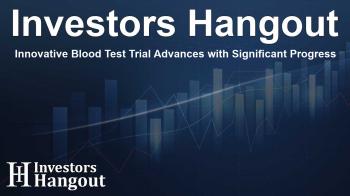Innovative Blood Test Trial Advances with Significant Progress

Major Milestone Reached in Blood Test Trial for Multiple Cancers
The MODERNISED clinical trial is making headlines as it passes a significant milestone in cancer detection. This groundbreaking study involves a unique blood test, known as ENLIGHTEN, which aims to identify signals from up to 10 different types of cancers at their most treatable stages. Researchers have successfully recruited more than 450 participants, demonstrating the trial's momentum and the growing interest in early cancer detection methodologies.
Understanding the ENLIGHTEN Blood Test
Unlike conventional techniques that primarily rely on fragments of tumor DNA circulating in the blood, ENLIGHTEN utilizes light signatures emitted by proteins to detect cancerous changes. This innovative approach is vital as it may unveil cancers that are otherwise undetectable due to their size, thus providing a more comprehensive means of early diagnosis. As traditional diagnostics often fail to catch cancers in their infancy, ENLIGHTEN represents a paradigm shift towards proactive health management.
Recruitment and Collaboration in the Trial
The ongoing recruitment phase aims to include around 1,000 NHS cancer patients, alongside 350 volunteers who are either symptomatic or healthy. This expansive study is coordinated by researchers from the University of Southampton, in conjunction with the Southampton Clinical Trials Unit and Proteotype Diagnostics Ltd, creating a collaborative environment for advancing cancer research.
Funding and Future Perspectives
The trial receives foundational support from the Office for Life Sciences, ensuring the necessary resources are available to explore the potential of ENLIGHTEN. As the UK's annual cancer diagnosis rate hovers around 385,000, the need for an effective multi-cancer screening initiative has never been more essential.
The Vision Behind Early Detection
Dr. Victoria Goss, an Associate Professor at the Southampton Clinical Trials Unit, emphasizes the importance of early diagnosis in improving treatment outcomes. The goal is to create tests capable of flagging multiple cancers during a single appointment, thereby streamlining the diagnostic process for patients.
A Closer Look at Patient Experiences
Stories from trial participants underline the urgency of advancing cancer detection methods. Ian Robinson, a 72-year-old participant, reflects on his experience with colorectal cancer, diagnosed through an NHS screening kit despite being asymptomatic. His hope is that by participating in this trial, he can contribute to better screening processes for future generations.
Ian Dickerson, who has battled early-stage cancer twice, shared his personal journey: "When you're told that you have cancer, the bottom drops out of your world. It's crucial to diagnose cancers early to minimize treatment and allow patients to continue enjoying their lives."
Innovative Approaches in Cancer Research
Proteotype's Chief Scientific Officer, Dr. Emma Yates, asserts that preliminary studies indicate ENLIGHTEN's effectiveness in detecting early-stage cancers reliably. The MODERNISED trial is set to validate these findings on a larger scale, with anticipated advancements in early cancer diagnosis showing promise for the future.
About Proteotype Diagnostics
Proteotype Diagnostics Ltd stands at the forefront of cancer detection innovation, aiming to create advanced multi-cancer screening solutions and personalized treatment options. By harnessing state-of-the-art technology and thorough scientific research, Proteotype is dedicated to enhancing patient outcomes through improved cancer diagnostics.
Frequently Asked Questions
What is the primary goal of the MODERNISED trial?
The MODERNISED trial aims to evaluate the effectiveness of the ENLIGHTEN blood test in detecting signals of up to 10 cancers at early, treatable stages.
How is the ENLIGHTEN test different from standard cancer screenings?
Unlike standard screenings that often rely on tumor DNA, ENLIGHTEN measures light signatures from proteins, allowing for the detection of cancers that do not yet shed DNA.
Who are the key partners involved in this clinical trial?
The trial is conducted by the University of Southampton, the Southampton Clinical Trials Unit, and Proteotype Diagnostics Ltd, collaborating to pioneer advancements in cancer detection.
What type of participants are being recruited for the trial?
The trial seeks to recruit 1,000 diagnosed cancer patients and 350 volunteers, both symptomatic and healthy, to gain diverse insights.
Why is early detection of cancer so important?
Early detection significantly increases treatment options and improves patient survival rates by identifying cancers before they progress to advanced stages.
About The Author
Contact Owen Jenkins privately here. Or send an email with ATTN: Owen Jenkins as the subject to contact@investorshangout.com.
About Investors Hangout
Investors Hangout is a leading online stock forum for financial discussion and learning, offering a wide range of free tools and resources. It draws in traders of all levels, who exchange market knowledge, investigate trading tactics, and keep an eye on industry developments in real time. Featuring financial articles, stock message boards, quotes, charts, company profiles, and live news updates. Through cooperative learning and a wealth of informational resources, it helps users from novices creating their first portfolios to experts honing their techniques. Join Investors Hangout today: https://investorshangout.com/
The content of this article is based on factual, publicly available information and does not represent legal, financial, or investment advice. Investors Hangout does not offer financial advice, and the author is not a licensed financial advisor. Consult a qualified advisor before making any financial or investment decisions based on this article. This article should not be considered advice to purchase, sell, or hold any securities or other investments. If any of the material provided here is inaccurate, please contact us for corrections.

